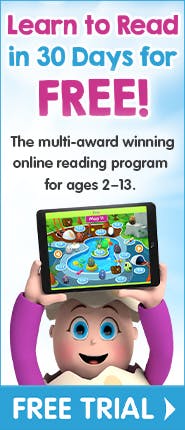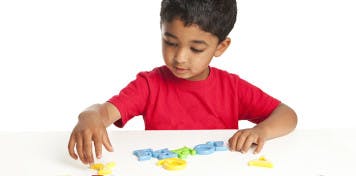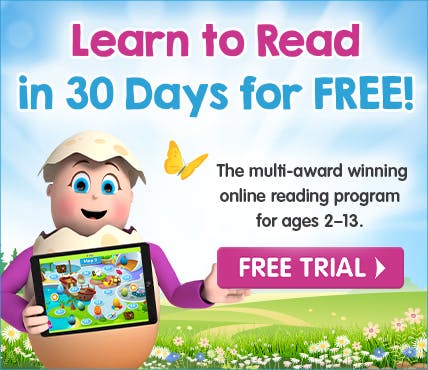


How to Teach Kids to Read: 10 Simple Steps to Try at Home

Teaching kids to read is easy and effective with ABC Reading Eggs' fun lessons, activities and over 3500 e-books. See how with a FREE trial today!
Most people don't think about the process of learning to read until they decide to start teaching their own children at home.
Contrary to what some people believe, learning to read is not a 'natural' process that happens all on its own. It's a complex one that requires the proper teaching of various skills and strategies, such as phonics (knowing the relationship between letters and sounds) and phonemic awareness.
The good news is that although reading itself is a complex process, the steps needed to build these skills are fairly simple and straightforward.
In order to teach kids how to read and make it a positive and rewarding experience, try these simple and time‑tested strategies below.
Here are 10 simple steps to teach your child to read at home:
1. Use songs and nursery rhymes to build phonemic awareness
Children's songs and nursery rhymes aren't just a lot of fun – the rhyme and rhythm help kids to hear the sounds and syllables in words, which helps them learn to read.
A good way to build phonemic awareness (one of the most important skills in learning to read) is to clap rhythmically together and recite songs in unison. This playful and bonding activity is a fantastic way for kids to implicitly develop the literacy skills that will set them up for reading success.
2. Make simple word cards at home
Cut out simple cards and write a word containing three sounds on each one (e.g. ram, sat, pig, top, sun, pot, fin). Invite your child to choose a card, then read the word together and hold up three fingers. Ask them to say the first sound they hear in the word, then the second, and then the third.
This simple activity requires little prep time and builds essential phonics and decoding skills (helping them learn how to sound out words).
If your child is just starting out with learning the letters of the alphabet, focus on the sound each letter makes, more so than letter names.
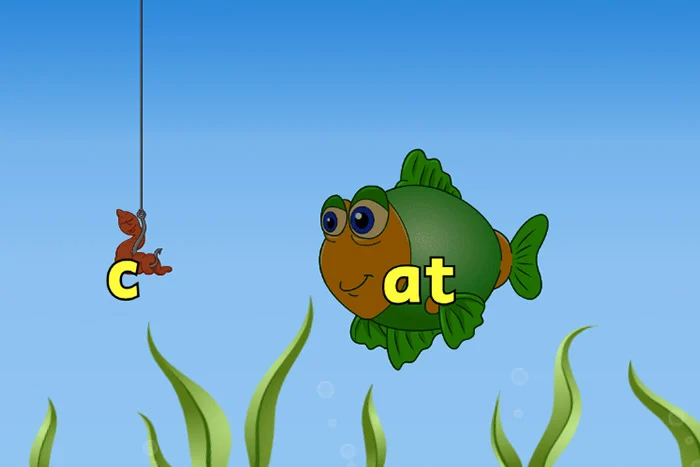
ABC Reading Eggs teaches kids to read with phonics – an important tool to help children decode and read words. Get access to hundreds of fun, highly engaging and interactive reading activities with a free trial.
3. Engage your child in a print-rich environment
Create daily opportunities to build your child's reading skills by creating a print‑rich environment at home. Seeing printed words (on posters, charts, books, labels, etc.) enables children to see and apply connections between sounds and letter symbols.
When you're out and about, point out letters on posters, billboards and signs. In time you can model sounding out the letters to make words.
Focus on the first letter in words. Ask your child “What sound is that letter?” “What other word starts with that sound?” “What word rhymes with that word?”
Download our free Initial Sounds printable workbook to help build your child's phonological awareness and phonics skills.
4. Play word games at home or in the car
Building on from the previous step, introduce simple word games on a regular basis.
Focus on playing games that encourage your child to listen, identify and manipulate the sounds in words.
For example, start by asking questions like:
“What sound does the word start with?”
“What sound does the word end with?”
“What words start with the sound ?”
“What word rhymes with ?”.
5. Understand the core skills involved in teaching kids to read
It's important to remember that learning to read involves various different skills. There are five essential components of reading. These are the skills all children need in order to successfully learn how to read. In summary, these include:
Phonemic awareness – the ability to hear and manipulate the different sounds in words
Phonics – recognising the connection between letters and the sounds they make
Vocabulary – understanding the meaning of words, their definitions, and their context
Reading comprehension – understand the meaning of text both in storybooks and information books
Fluency – the ability to read aloud with speed, understanding and accuracy
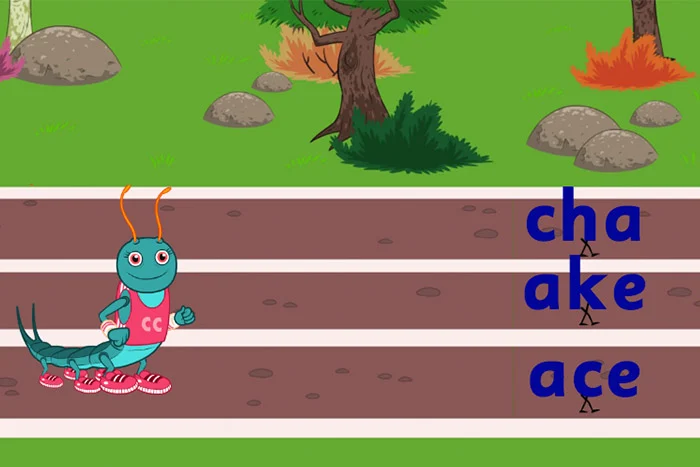
Reading Eggs is a comprehensive online reading program that teaches children how to read and become skilled readers. Start your 30-day free trial today!
6. Play with letter magnets
Middle vowel sounds can be tricky for some children, which is why this activity can be so helpful.
Prepare letter magnets on the fridge and pull the vowels to one side (a, e, i, o, u).
Say a CVC word (consonant-vowel-consonant), for example, 'cat', and ask your child to spell it using the magnets.
To help them, say each vowel sound aloud (/ayh/, /eh/, /ih/, /awe/, /uh/) while pointing at its letter, and ask your child which one makes a sound similar to the middle sound.
7. Harness the power of technology to keep your child engaged
Learning to read should be an enjoyable process to keep kids motivated to improve. Sometimes a child might be full of excitement and eagerness to learn at the beginning, but once they hit a wall can feel overwhelmed and give up easily.
As a parent, it can feel impossible to pick up again and know where to fill in any gaps that may be causing frustration.
ABC Reading Eggs uses self‑paced lessons that match each individual child's ability. Children are regularly rewarded for completing activities and reaching new levels, which keeps them motivated to stay on track. Parents can also view instant progress reports to see how a child's skills are improving. Find out more about how ABC Reading Eggs works.
Teach your child to read at home with ABC Reading Eggs!
ABC Reading Eggs is the multi-award winning online reading program designed by educational experts to make learning to read easy and fun. Watch your child's reading confidence grow as they follow the guided one‑on‑one lessons full of colourful animations, catchy songs and exciting rewards. Start your 30-day free trial today!
8. Read together on a daily basis and ask questions about the book
A lot of people don't realise just how many skills can be picked up through the simple act of reading to a child.
Not only are you showing them how to sound out words, you're also building key comprehension skills, growing their vocabulary, and letting them hear what a fluent reader sounds like.
Most of all, regular reading helps your child to develop a love of reading, which is the best way to set them up for reading success.
Strengthen your child's comprehension skills by asking questions while reading.
For younger children, encourage them to engage with the pictures (e.g. “Do you see the boat? What colour is the cat?”).
For older children, ask questions about what you've just read, like “Why do you think the little bird was afraid?” “When did Sophie realise she had special powers?”
9. Play games to memorise high-frequency sight words every day
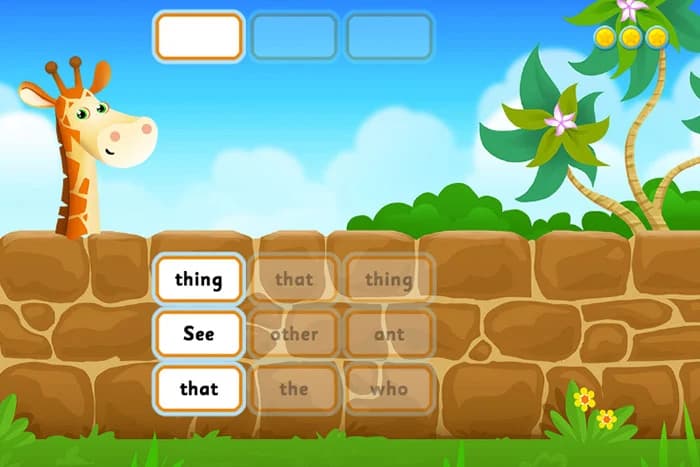
Sight words are ones that cannot be easily sounded out and need to be recognised on sight. High‑frequency sight words are ones that occur very often in reading and writing (e.g. you, I, we, am, had, and, to, the, have, they, where, was, does).
The strategy for learning sight words is, "See the word, say the word".
Learning to identify and read sight words is essential for young children to become fluent readers. Most children will be able to learn a few sight words at the age of four (e.g., is, it, my, me, no, see, and we) and around 20 sight words by the end of their first year of school.
You can teach sight words by playing with flashcards and using reading programs like ABC Reading Eggs.
10. Be patient – the best way to teach kids to read is to make it fun!
Every child learns at his or her own pace, so always remember the single most important thing you can do is to make it enjoyable.
By reading regularly, mixing things up with the activities you choose, and letting your child pick out their own books occasionally, you'll instil an early love of reading and give them the best chance at reading success in no time.
Watch the video below to discover more tips on how to teach your child to read at home.
Teach your child to read at home with ABC Reading Eggs!
ABC Reading Eggs is the multi-award winning online reading program designed by educational experts to make learning to read easy and fun. Watch your child's reading confidence grow as they follow the guided one‑on‑one lessons full of colourful animations, catchy songs and exciting rewards. Start your 30-day free trial today!
